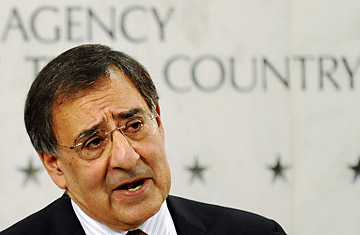
CIA Director Leon Panetta makes remarks at his ceremonial swearing-in on Feb. 19
It's a sign of the times: In addition to his morning national-security briefing, President Barack Obama has, starting today, begun to receive a daily economic-intelligence document, put together by several U.S. intel agencies. Obama already gets a daily outline on the state of the U.S. economy; the new report concentrates mainly on intelligence about foreign economies. (See which country has the best bailout plan.)
The new CIA director, Leon Panetta, told journalists that it was important to know how the global economic downturn is affecting the stability and foreign policies of key U.S. allies and rivals, especially China, Russia and countries in Latin America. He singled out Argentina, Ecuador and Venezuela as countries in particularly dire straits. The briefing will also be shared with "key players in the Administration." The objective, Panetta said, is to "give policymakers a feel for what's going on ... so they can use it [in decision-making]."
"What happens in the economy and what's happening as a result of that is affecting the stability of the world," Panetta said. "As an intelligence agency, we've got to pay attention to that because we have to know whether or not the economic impacts in China or Russia or any place else are influencing the policies of those countries when it comes to foreign affairs and when it comes to the issues that we care about."
In analyzing economic trends, he said, the CIA's goal would be "to make sure that we aren't surprised by the implications of the worldwide economic crisis and what happens with countries...as a result of that.
Earlier this month, the director of National Intelligence, Admiral Dennis Blair, told a Senate hearing that the global economic crisis had replaced terrorism as the "primary near-term security concern" for the U.S. Blair's office has produced a report saying that economic crises had already led to some degree of political instability in a quarter of the world's nations. (See pictures of the global financial crisis.)
In his first briefing to journalists since being sworn in last week, Panetta reiterated his opposition to the use of torture to extract information from terrorism suspects. He said the Army Field Manual "gives us all the capabilities we need to interrogate." He said he would not personally order any so-called enhanced interrogation techniques used during the Bush Administration. Although the President has the power to authorize such techniques, Panetta said he would not recommend them to Obama.
But Panetta added that he would not support any prosecution of CIA officials who had used the techniques approved by the Bush Administration because "they were doing their jobs."
